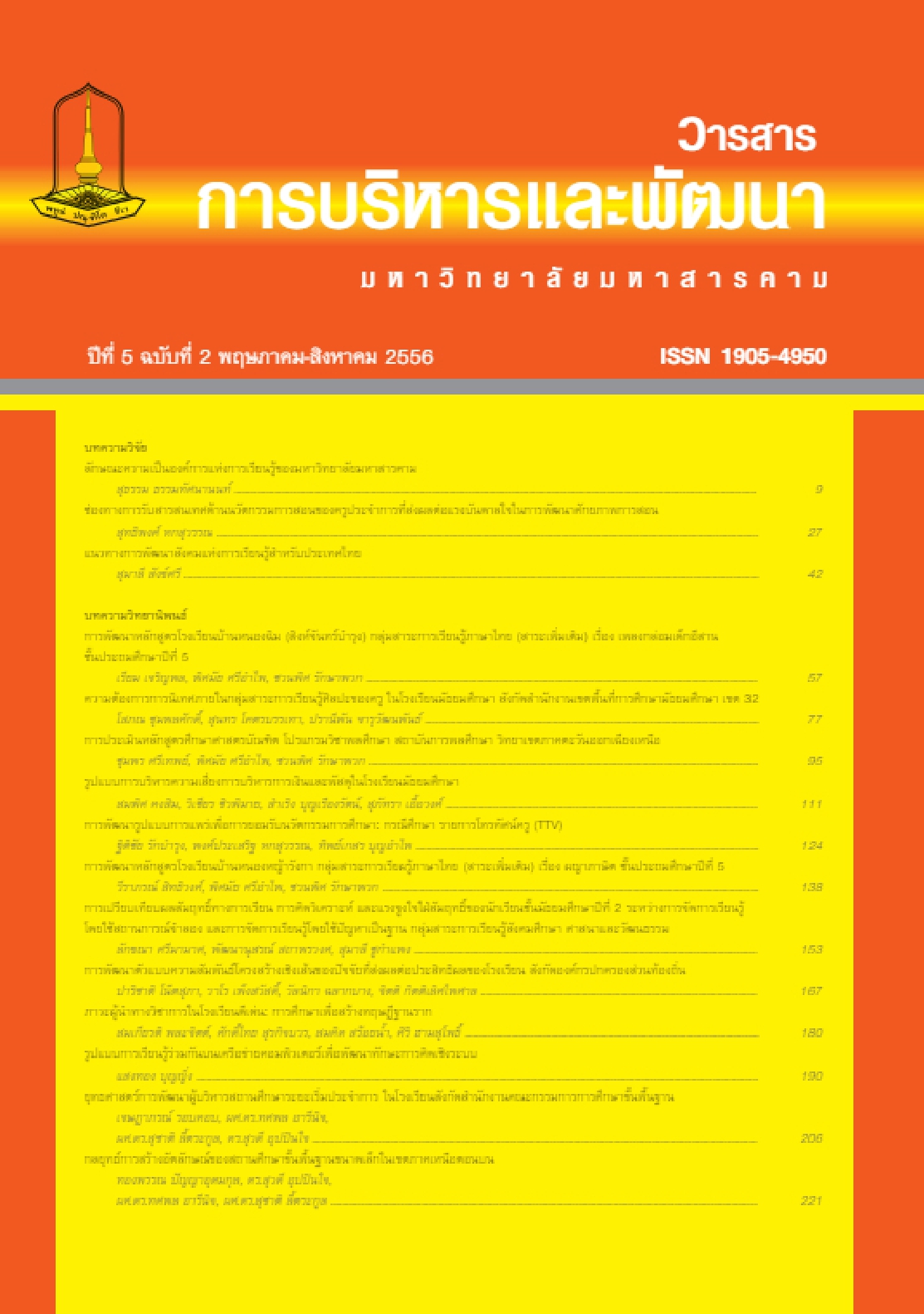The Curriculum Evaluation of Bachelor Education Program in Physical Education Institute Northeastern Campus
Main Article Content
Abstract
Curriculum evaluation is the collection and study of data including data analysis and the utilization of information to adjust and develop curriculum so as to make the curriculum up-to-date and in line with current social conditions. This research study, using the CIPP Model form, aimed to evaluate the curriculum of Bachelor of Education in Physical Education, Institute of Physical Education, northeastern campuses in the academic year 2011. Using the Stratified Random Sampling technique, the sample consisted of 631 affiliates which include 34 instructors, 90 students, 169 graduates, 169 graduates’ superiors, and 169 graduates’ colleagues. The research instruments of the study were composed of four sets of 5-leveled rating-scaled questionnaires and four sets of structured interviews. Statistics employed in data analysis were percentage, Mean, and Standard Deviation.
Findings of the study were as follows:1. The instructors, students, and graduates thought that, overall and in detail aspects, the context which includes the objectives, structure, and content of the curriculum were at the “highly appropriate” level. They suggested that the learner needs should be surveyed in order to be employed as a guideline for further curriculum development as well as there should be the instruction of some courses including English for Communication, Introduction to Research Study, and the Utilization of Office Computer.
2. The instructors, students and graduates thought that, overall and in detail aspects, the fundamental factors which include characteristics of learners, characteristics of instructors, educational materials, media, textbooks, and location of instruction were at the “highly appropriate” level. They recommended the sufficient provision of computers for students to use for searching and the increase of physical education instruments employed in instruction.
3. The instructors, students and graduates thought that, overall and in detail aspects, the processes which include instruction, measurement and evaluation, and curriculum administration processes were at the “highly agree” level. They suggested a plan to increase the number of instructors and facilitative staff members in accordance with the work load so that instructors take teaching part only.
4. The graduates, the graduates’ superiors, and the graduates’ colleagues thought that, overall and in detail aspects, the outcome which includes general performance; virtue, morality, and professional ethics; and physical educational performance were at the “highly appropriate” level. They suggested that graduates should additionally research into new and up-to-date knowledge in order to catch up with the current changing world and for self-development.
In conclusion, the curriculum of Bachelor of Education in Physical Education, Institute of Physical Education, northeastern campuses were at the “highly appropriate” level in all aspects. Therefore, the curriculum should be continuingly implemented. Yet, ways to develop the more appropriate curriculum should be obtained for the excellence in Physical Education later on.
Downloads
Article Details
References
Breithaupt, David L. “Collaborative Curriculum Development : An instructional Technology Integration Model for School-university Partnerships,” Dissertation Abstracts International. 58(05) : 1668-A ; November, 1997.
Brigman, Greg A. “The Effects of Student Readiness Training on the Listening Comprehension, Attending, and Social Skills of Kindergarten Students (Readiness, Attention),” Dissertation Abstracts International. 52(08) : 2814-A ; February, 1992.
Chatawiti, Sompong et. al., (2009). Evaluation of Bachdelor’s of Physical Education, Faculty of Education, Physical Education Institute, 2005 (Revised Issue 2007), Bangkok: Physical Education Institute,
Chukampang, Chawalit. (2008). Curriculum Development. Mahasarakam: Mahasarakam University.
. (2010). Curriculum and Teaching Research. Mahasarakam: Mahasarakam University.
Janreun, Jutatip. (2009). Evaluation of Master’s of Education Thesis in Educational Measurement and Evaluation, Faculty of Education, Chiengmai University. Master of Education Thesis, Mahasarakam: Mahasarakam University,
Poonachai, Tamrong. (2004). Evaluation of Master of Education Program in Educational Research, Faculty of Education, Mahasarakam University. Master of Education, Mahasarakam: Mahasarakam University,
Ritwong, Patrawan. (2004). Evaluation of Master of Education Program in Educational Administration, Faculty of Education, Mahasarakam University. Master of Education, Mahasarakam: Mahasarakam University,
Samanyat, Jarinya. (2009). Evaluation of Bachdelor’s of Sport Science Program, Physical Education Institute, North Eastern Campus. Master of Education Thesis, Chiengmai: Chiengmai University,
Sooknalam, Anin. (2005). Evaluation of Master of Education Program in Curriculum and Instruction, Faculty of Education, Mahasarakam University. Master of Education, Mahasarakam: Mahasarakam University,
Soontonrote, Wimonrat. (2010). Innovation for Learning. The 5th Edition. Kalasin: Prasan Printing,
Sri-sa-ad Boonchom et. al., (1985). Curriculum and teaching Development. Mahasarakam: Department of Foundation of Education, Srinakarintarawirot Mahasarakam University,
Neville, Lynn Bertino. “Quality Assurance and Improvement Planning in Two Elementary School : Case Studies in Illinois School Reform,” Dissertation Abstracts International. 60(04) : 963-A ; October, 1999.
Wongyai, Wichai. (1994). Curriculum Development Process and Practice Teaching. Bangkok: Suwiriyasan.


